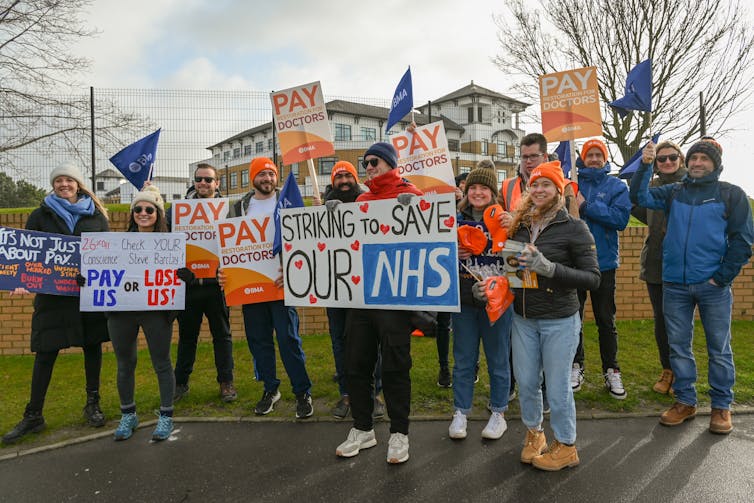why higher pay for health workers could lead to a more efficient and effective system
- Written by Nick Krachler, Senior Lecturer in Human Resource Management, King's College London

A comprehensive review[1] of the UK National Health Service’s performance has diagnosed the NHS as being in a “critical condition”. While also emphasising its strong “vital signs”, the report, by surgeon and former Labour minister Lord Darzi, certainly highlights many challenges.
The author said he was “shocked” by his findings, and the prime minister has promised[2] a ten-year plan to reform the service. Our research suggests that part of that plan must be to address NHS pay and staffing levels – and the morale of the people who look after the sick.
Darzi’s report was published just days before junior doctors in England are due to finish voting[3] on a new pay deal which amounts to an average rise of 22.3%[4], compared with pay rates in 2023.
If the doctors agree to accept the offer, their pay rise will cost the UK Treasury about £350 million. But the chancellor of the exchequer, Rachel Reeves, has argued[5] that this is much less than the cost to the NHS of junior doctors’ industrial action[6] (estimated at £1.7 billion so far).
The government will no doubt be hoping that a deal will start to heal an NHS scarred by the issues reported by Darzi. To tackle performance issues like long waiting lists, hospitals badly require[7] more doctors, nurses and other health workers. And they need to keep hold of the ones who may be tempted to leave in search of better working conditions elsewhere.
An improved pay package for junior doctors could play a part in persuading them to stay. Research suggests that dissatisfaction[8] over remuneration is a major factor behind people working in healthcare choosing to leave[9] their jobs.
There is also evidence that improved staffing levels[10] lead to better health outcomes for patients. It has also been shown that unionisation improves[11] those outcomes, because it helps to secure better working conditions[12], which mean health workers are more satisfied with their jobs and have enough time to do them well.
So perhaps the UK government’s pay offer signals a new direction for NHS pay trends, and a strategy that aims to achieve a balance between salaries and workloads. If it does – and if NHS staff perceive it to be fair – this could begin to overturn current low staff morale[13] and high levels of vacancies[14].
But it’s not just the doctors who think they should be paid more. At the end of June 2024, in our survey of a representative sample[15] of 2,252 UK residents aged 16-75, 48% of respondents thought that newly qualified junior doctors on £32,398 a year were paid too little. Only 6% thought they were paid too much. Similarly, 49% thought that newly qualified nurses on £28,407 were not paid enough.
The link between pay levels, workloads, and thinking about leaving a job can be explained by a concept known as an “effort-reward bargain”[16]. It’s a feeling many people will be familiar with, wherever they work, and relates to the perceived fairness of the balance between the effort demanded by an employer and the rewards that employees receive. When people feel overworked and underpaid, the effort-reward bargain is not what it should be.
Where increased effort occurs, employees expect increased rewards, otherwise they perceive the situation to be unfair[18]. Generally, unfairness reduces motivation, increasing levels of dissatisfaction and intentions to leave[19].
Other important factors related to workloads and pay include nurses’ poor physical and mental health[20], and a sense of being unable to deliver care to high enough standards[21].
These issues are not restricted to the UK, with many other wealthy countries[22] facing similar challenges. Health workers including doctors, nurses and ambulance workers in Ireland, France and Germany[23] have gone on strike due to poor working conditions in recent years. In 2022, the World Health Organization’s European director called workforce challenges in healthcare a “ticking timebomb”[24].
For long-term improvement in healthcare services, the government needs to ensure a fair effort-reward bargain, which should start by addressing pay concerns for all frontline NHS staff – and continue by embedding rewards into a comprehensive workforce strategy. This will require additional investment, but it is an investment which will lead to increased motivation, better staff retention and improved services – which will result in a better, more efficient NHS.
References
- ^ review (assets.publishing.service.gov.uk)
- ^ has promised (www.itv.com)
- ^ finish voting (news.sky.com)
- ^ average rise of 22.3% (www.bma.org.uk)
- ^ has argued (www.theguardian.com)
- ^ industrial action (www.bma.org.uk)
- ^ badly require (www.england.nhs.uk)
- ^ dissatisfaction (journals.sagepub.com)
- ^ choosing to leave (www.hee.nhs.uk)
- ^ improved staffing levels (www.thelancet.com)
- ^ unionisation improves (www.elgaronline.com)
- ^ better working conditions (journals.sagepub.com)
- ^ low staff morale (www.nhsstaffsurveys.com)
- ^ high levels of vacancies (www.england.nhs.uk)
- ^ our survey of a representative sample (www.kcl.ac.uk)
- ^ “effort-reward bargain” (www.taylorfrancis.com)
- ^ Ajit Wick/Shutterstock (www.shutterstock.com)
- ^ unfair (onlinelibrary.wiley.com)
- ^ intentions to leave (www.hup.harvard.edu)
- ^ poor physical and mental health (www.nmc.org.uk)
- ^ high enough standards (www.sciencedirect.com)
- ^ other wealthy countries (www.oecd-ilibrary.org)
- ^ Ireland, France and Germany (www.who.int)
- ^ “ticking timebomb” (www.who.int)







